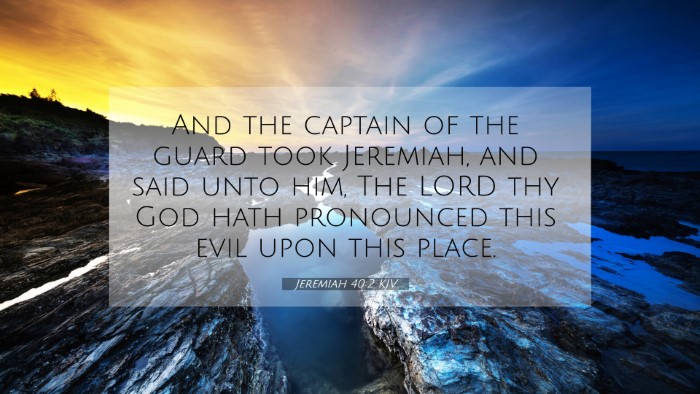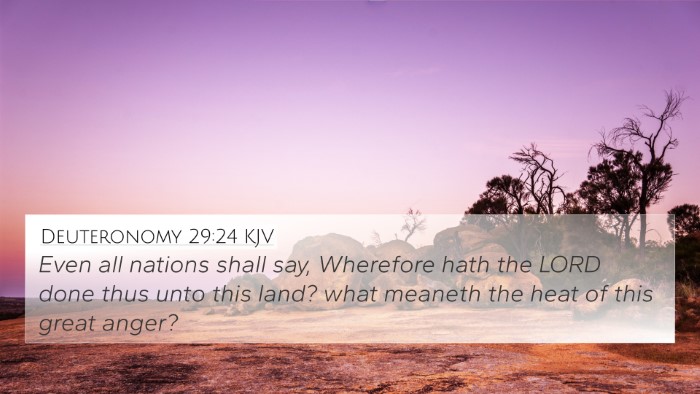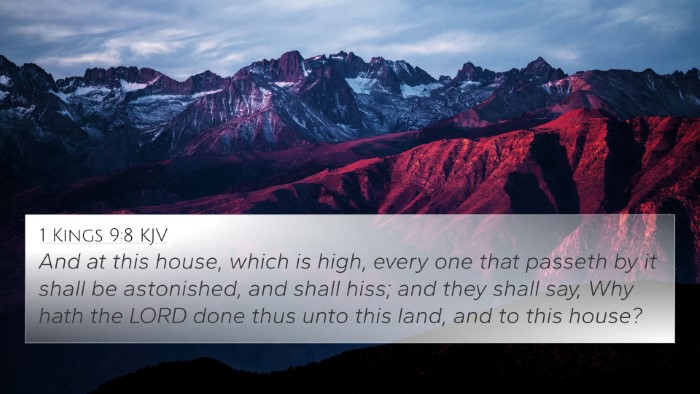Understanding Jeremiah 40:2
Jeremiah 40:2 states: “And the captain of the guard took Jeremiah, and said unto him, The LORD thy God hath pronounced this evil upon this place.”
Context of the Verse
This verse occurs in a pivotal moment within the Book of Jeremiah, illustrating the aftermath of the destruction of Jerusalem and the Babylonian exile. Jeremiah, the prophet, is taken captive yet is distinguished as a messenger of God's will.
Commentary Insights
This verse has been interpreted through various commentaries, providing a rich understanding from multiple perspectives:
- Matthew Henry: Henry emphasizes the sovereignty of God in orchestrating events. He notes that the captain of the guard recognizes the divine judgment expressed through Jeremiah’s prophecy, highlighting the importance of prophecy as a validation of God’s word. This also serves as a reminder of God’s justice against sin.
- Albert Barnes: Barnes focuses on the captain of the guard's acknowledgment of God's role in the calamity that has befallen Jerusalem. He represents the idea that even secular authorities recognize divine intervention, underscoring the interplay between divine prophecy and historical events.
- Adam Clarke: Clarke elaborates on the emotional aspect of Jeremiah’s situation. He emphasizes that despite being a prisoner, Jeremiah is treated with respect, showcasing a difference in treatment between God’s chosen prophet and the rest of Jerusalem's populace who suffered the consequences of their sins.
Thematic Connections
This verse brings forth themes of divine judgment, prophecy, and the interplay between human authority and divine will. It encourages a deeper examination of how God communicates His intentions through prophets, and how those messages are recognized - or ignored - by those in power.
Cross-References
Jeremiah 40:2 correlates with several other Bible verses that help to illuminate its meaning and implications:
- Jeremiah 1:10: God appointing Jeremiah as a prophet to nations.
- 2 Chronicles 36:15-16: God's messages being sent through prophets being disregarded.
- Ezekiel 12:1-2: A parallel scenario of God's message not being heeded by the people.
- Zephaniah 3:2: A description of a disobedient city failing to heed prophetic warning.
- Matthew 23:37: Jesus lamenting over Jerusalem for rejecting prophets.
- Lamentations 2:14: The role of prophets in exposing Israel's iniquities.
- Romans 9:27: A reference to the remnant that God preserves despite judgment.
Practical Applications
Jeremiah 40:2 invites reflection on the authority of divine messages in our lives today. It encourages us to:
- Recognize the significance of prophetic teachings, both historical and contemporary.
- Heed warnings and guidance from scripture to avoid the fates similar to those experienced by Jerusalem.
- Understand the historical context behind God's judgment, enriching our interpretations through the use of cross-references.
Conclusion
In summary, Jeremiah 40:2 stands as a solemn reminder of God's sovereignty and the weight of divine prophecy. Through cross-referencing this verse with others, believers can gain deeper insights into God’s continuous communication and the consequences of heeding or disregarding His messages. This understanding aligns with the importance of Bible verse cross-references in enriching one’s spiritual journey.







